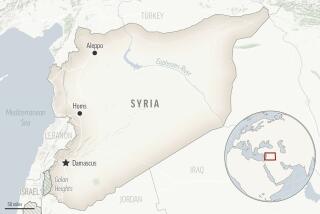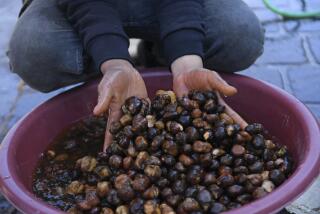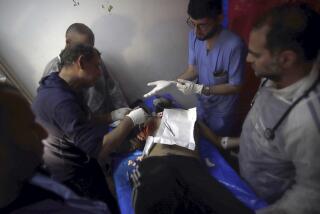Fighting persists in Syria despite U.N. Security Council call for a 30-day truce ‘without delay’
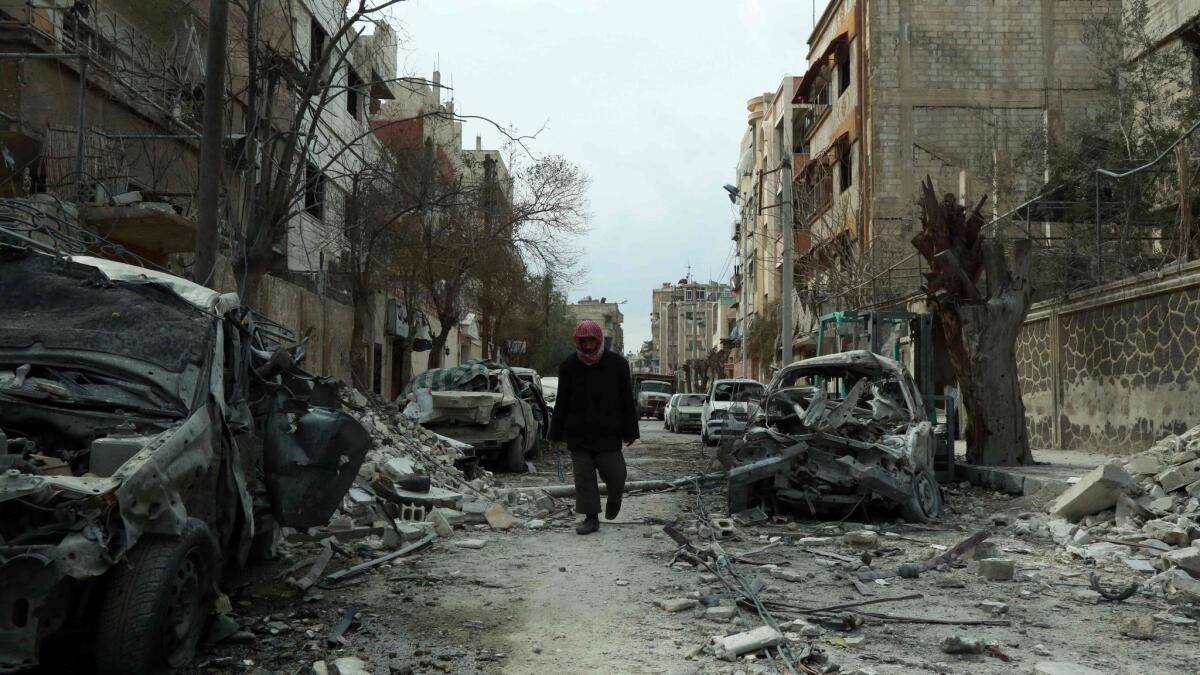
Hours after the United Nations Security Council called for a 30-day halt to the fighting in Syria, government forces attacked a rebel-held eastern suburb of Damascus from the air and the ground Sunday, and rebels lobbed shells at the capital, residents and activists said.
One child died after suffering symptoms consistent with a chlorine attack, according to the Syrian American Medical Society, which said the child was among 16 patients admitted to a hospital it supports in eastern Ghouta with those symptoms. There was no immediate response from the Syrian government to the report.
The continued bombing of eastern Ghouta came as a bitter, although not unexpected, disappointment to residents who have endured one of the bloodiest assaults in seven years of civil war. More than 500 civilians were killed in eight days of airstrikes and artillery fire, according to opposition activists. Nearly a quarter of the dead are children.
Although the shelling of residential areas seemed less intense Sunday, at least eight more people were killed, including three children, according to the Syrian Observatory for Human Rights, a pro-opposition monitoring group based in Britain.
Activists on both sides also spoke of a multi-pronged ground offensive, resulting in fierce clashes between government and rebel forces on the enclave’s western and southern edges.
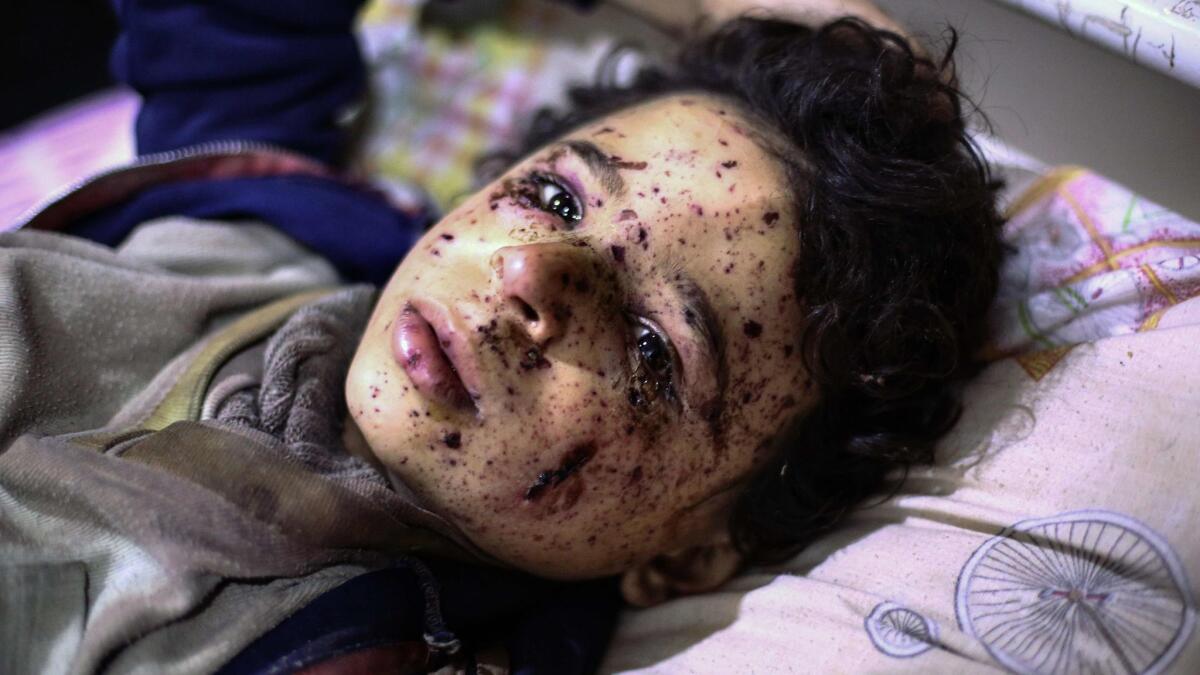
“There is no cease-fire at all,” said Firas Abdullah, an opposition activist reached in the city of Duma, as explosions reverberated in the background.
Sunday brought some relief, however, to central neighborhoods of Damascus, where at least 16 people died in rebel shelling over the past week, according to state media reports. Schools opened and residents ventured from their homes for the first time in days.
But their freedom was short-lived. Police told the state-run Syrian Arab News Agency (SANA) that rebels fired 21 “rocket shells” on government-held areas in and around the capital. One civilian was wounded.
The Security Council resolution, which was approved unanimously Saturday after repeated delays, called on all parties in Syria to “cease hostilities without delay” to permit the delivery of humanitarian aid and the evacuation of critically sick and wounded civilians from besieged communities. But exceptions were made for military operations against Islamic State, Al Qaeda-affiliated groups and other groups designated as terrorist organizations.
Iran’s military chief of staff, Gen. Mohammad Baqeri, whose government has provided critical backing to Syrian President Bashar Assad, said the cease-fire does not apply to parts of the Damascus suburbs “held by the terrorists,” according to Iranian news reports.
The Turkish deputy prime minister, Bekir Bozdag, said the U.N. resolution also would not affect his country’s offensive against Kurdish fighters in Syria’s northwestern Afrin region. Turkey regards the Syrian Kurds as an extension of a group that has waged a decades-long insurgency on its side of the border.
Nicola Zahr, a Damascus-based political activist, said the aim of the government’s ground offensive in eastern Ghouta was to rout fighters linked to the one-time Al Qaeda affiliate known as the Committee for the Liberation of Syria.
However, rebels say the group accounts for just a few hundred fighters in the enclave. The main rebel factions, the Army of Islam and the Rahman Corps, contend that the government and its allies are using the presence of small numbers of fighters with links to Al Qaeda as a pretext to continue their campaign against the last major rebel stronghold near the capital.
“Today, Assad, Russia and Iran are throwing the resolution out the window,” said Wael Olwan, a spokesman for the Rahman Corps.
Government officials counter that the other factions in the region are effectively allied with Al Qaeda-linked ones.
Conditions in eastern Ghouta, a collection of towns and farms that is home to nearly 400,000 people, have grown increasingly desperate since pro-government forces surrounded the enclave in 2012. The region has some of the highest malnutrition rates recorded among Syrian children since the start of the conflict in 2011.
The intense bombardments of the past week drove much of the population underground, into crowded basements and makeshift shelters that many feared would become their graves.
The number of wounded — more than 2,500, according to medical relief groups — overwhelmed rescue workers and health facilities, some of which have themselves become targets.
News of the Security Council resolution raised hopes for a possible reprieve.
“Early in the morning, around 5 a.m., people went above ground to see what was happening, but they barely had a chance to check on their houses and clean up before the shelling came back,” said Bayan Rehan, who heads a women’s affairs office at a local council in Duma, the region’s main city. “By 7 a.m., the first shells fell.”
Ingy Sedky, a spokeswoman for the International Committee for the Red Cross, said the organization was ready to deliver much needed medicines, food and other aid to the enclave but had not yet received a green light from the warring parties.
“So far, I have to say it doesn’t look promising at all,” she said by phone from Damascus.
Bulos is a special correspondent.
Twitter: @alexzavis
More to Read
Start your day right
Sign up for Essential California for news, features and recommendations from the L.A. Times and beyond in your inbox six days a week.
You may occasionally receive promotional content from the Los Angeles Times.
